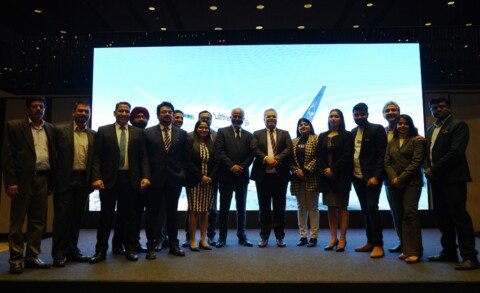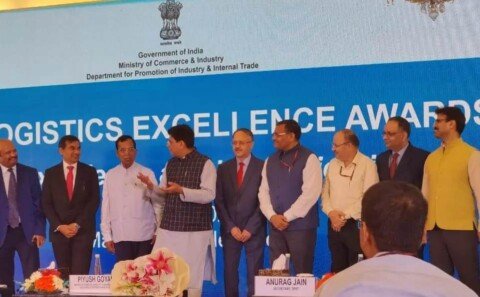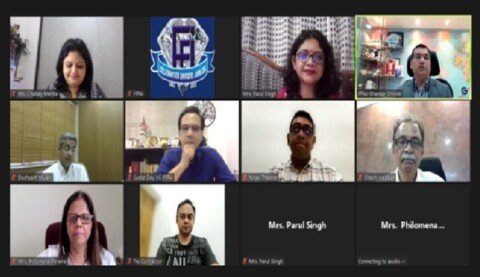PHD Chamber of Commerce and Industry (PHDCCI) organised the 7th edition of PHD Global Aviation & Air Cargo Summit with the theme ‘Aviation – Air Cargo Industry’s New Growth Blueprint & Business Resurgence Parameters’ from March 12 – 13 through virtual mode.
The summit witnessed panel discussions on ‘Returning to the Skies-4R’s of Recovery’, ‘New Business Profit Models and Sustainability Initiatives for Future’ and ‘Allied Industries Growth Blueprint: Drones and Skilling Sectors’ on March 12 and the discussion on ‘Air Cargo-Sustainability Initiatives for Future’ was organised on March 13.
Throughout the 2-day event, key note speakers and session chairs from India’s Ministry of Civil Aviation (MoCA), corporate as well as business leaders from across the global aviation and logistics industry attended the programmes.
On the first day of the summit, the Chief Guest on the occasion, Pradeep Singh Kharola, IAS, Hon’ble Secretary, Ministry of Civil Aviation (MoCA) said that the Indian aviation sector has faced a lot of challenges caused by the pandemic but survived due to air freight, implicating the extensive potential of air cargo across borders. “An aviation system can function when all the parts of the system function efficiently and in sync with each other.”
Kharola opined that the new normal in the aviation industry is the safe contactless mode of travel. “Air travel has immerged as one of the safest modes of travel during these tough times. In the current situation, people’s confidence in aviation has improved due to which new areas of travel and new customers are immerging.”
Kharola emphasised that aviation is an international activity, and that stakeholders should understand and appreciate its economic importance. “Governments and the industry should work together to build equitable and strong partnerships– open new airports, bring in efficiency, and reduce cost.”
Vandana Aggarwal, Sr Economic Advisor, MoCA mentioned that there is an increase in the performance efficiency of air cargo and it’s time for India to aspire for a more equitable role in the sector.
Aggarwal talked about government initiatives to increase multimodalities, such as India’s engagement in transhipments and development of freight corridors which will provide the opportunity for growth of cargo for countries. “With drones becoming the new normal, traditional cargo movements have to adapt themselves with last-mile connectivity using drones,” she said.
She revealed that the government is working on a unified interface platform and national logistics portal which will integrate and provide advanced information to the regulators so that the dwelling time is lower and all performance metrics and costs gets regulated and reduced.
Aggarwal shared that India is one of the few countries that has added air trade capacity on measurable terms besides the B2C conversions. “We have added many freighters during the lockdown periods. We will be inducting some more freighters. As the freighter capacity has increased, the ability to service the industry cost-effectively by the airlines will improve as well.”
She emphasised that air cargo has provided valuable revenues to the airlines to sustain themselves during the pandemic. Air cargo has been the humanitarian belly of this pandemic by transporting kits, essential goods, and vaccines to various parts of the world.
H E Dr Ahmed A R Albanna, Ambassador, United Arab Emirates to India while talking about the strategic relationship shared between India and UAE, mentioned that the aviation sector is a key player in building overall bilateral relationship, governed by the air service agreement. He mentioned about the region’s close partnership with India to further strengthen aviation linkages and early reception of scheduled flights under the UAE-India Air service agreement.
“The aviation sector is a connective bridge and we will play an important role in letting the road to recovery during COVID-19 and we need to look at different and innovative ways to build our aviation industry recover,” he said.
Asein Isaev, Ambassador Extraordinary and Plenipotentiary of the Kyrgyz Republic to India appreciated India’s pivotal role in supporting the nation during the times of pandemic- one of the key supplier for pharma products, adding that, “We have done some amendments in the airports and we are keen it will wider the possibilities to air connection.”
He also discussed about that the connection between India and Kyrgyz Republic is in terms of cultural, diplomatic, trade, and people-to-people connection.
Glyn Hughes, Director General, The International Air Cargo Association mentioned that due to the pandemic, we have learned that collaboration and communication are the keys to the seamless running of the industry. We have also learned flexible working, leverage digital platforms, and innovation in increasing the cargo capacity. The future blueprint will focus on sustainability.
Sanjay Aggarwal, President, PHD Chamber of Commerce and Industry in his presidential address deliberated about the importance of the aviation and cargo sector which played a pivotal role in being the engine of connectivity and enabler for growth worldwide for international trade.
Aggarwal deliberated about the challenges faced in the resuming of operations and the need to look at new growth parameters to revive itself, he discussed the new technologies that have seeped into airports that are dynamically changing the passenger travel experience. The pace of innovation adoption sets the scene for rapid industry transformation and will force the aviation industry to reset, rebuild, reinvent and become resilient.
The air cargo sector has been instrumental in the transportation of essential supplies worldwide. This industry is playing a crucial role in the transportation of the COVID-19 vaccine and there is a need to adapt infrastructure, processes, and resources to respond to huge global logistical challenges, said Aggarwal.
Sanjay Aggarwal emphasised that the civil aviation market is expected to see some surge with the availability of vaccines, people’s willingness to travel, and recovery in the macroeconomic growth of domestic air traffic. The government’s emphasis on infrastructure under the Aatmanirbhar- Make in India initiative in the aviation industry and giving a push to the aircraft leasing market will help this industry to bounce back seamlessly.
Saket Dalmia, Vice President, PHD Chamber of Commerce and Industry while proposing the formal vote of thanks to all the delegates and participants, mentioned that government understands the critical nature of aviation and cargo.
Rajesh Arora, Chair, PHD Civil Aviation Committee mentioned that with the change in the pandemic scenario, there is a steady increase in the passenger traffic; successful international operations of the air bubble and Vande Bharat flights; robust performance of cargo business and regular coming back of business travel, there is the recovery in this industry. Some of the key learnings this industry has got amidst the pandemic are agility and flexibility management of situation and digitalisation of service. He discussed the steps untaken by the government to mitigate the impact of the pandemic and help to bounce back.
The session was moderated by Dr Ranjeet Mehta, Deputy Secretary General, PHD Chamber.
On the second day of the summit, Vandana Aggarwal, Sr Economic Adviser, MoCA deliberated about aircraft leasing– an important part of the aviation and air cargo industry. She opined that the need is to have regulations in place to ensure seamless working of this important sector.
She also deliberated on the growth blueprint for the MRO and OEM industry and said that the country needs to have its own systems so as to be less dependent on others.
“Rules on drones are in process and many new players will get involved which will benefit the industry, along with the development of green zones for drones movement,” she continued.
Salil Gupte, President, Boeing India while discussing the process of leasing mentioned that the Ministry of Civil Aviation along with the Ministry of Finance has taken action to make India quite competitive so that players within India can participate in the aircraft leasing market. He mentioned that many small players can become large players and create an eco-system that is attractive to everyone in the leasing market. We believe that the reforms have put India in that position that it can take advantage of being an attraction point.
He also mentioned that after COVID-19, there is significant passenger preference towards long haul flights and India has the advantage due to its geographical location and this can be a business model on which Indian airlines can work.
Alok Anand, Chairman and CEO, Acumen Aviation mentioned Aircraft operating lease has been actioned as an item in the IFSC GIFT City. He also mentioned that we need to work on finance leasing and we are working on the same. While we are inviting investments from various parts of the world, we need to think about global partnerships. We need to invest in training and skill development so that India builds its talent pool.
Dipesh Shah, Head (Development), International Financial Services Centres Authority, GIFT City, Gujrat mentioned that India has huge demand and aircraft leasing can be an opportunity for India as it can replace many services which are coming into India. We should take a closer look at the talent available in India which is enormous. We are going in the right direction to bring businesses that can be done efficiently and in a cost-effective manner.
Vipul Singh, CEO & Co-Founder, Aarav Unmanned Systems (AUS) while moderating the technical session on Allied Industries Growth Blueprint mentioned that while this year has been the year for the pandemic, it has been the year of drones as well. There is a complete paradigm shift in the buying and usage of drones in India and they are being used for diverse sectors and purposes. With many changes happening, there is a need for upskilling the manpower in the aviation sector.
Ankit Mehta, Co-Founder & CEO, ideaForge Technology mentioned that India has a different climate and geographical conditions so we need to qualify our products for all these varied environments. Talking about global relevance, he mentioned that we all have to build interfacing standards so that we integrated over a larger period. We need to have an investment system for reaching the international markets.
The session was moderated by Bhavna Singh, Joint Secretary, PHD Chamber.







